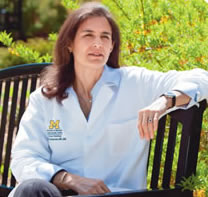What's the Fallout?

A U-M radiologist answers questions about the risks of commonplace exposure to radiation
For some cancer survivors, commonplace exposure to radiation induces pangs of worry. Will the chest X-ray ordered by a family doctor or a trip through the airport's new security scanner increase your chance of developing a secondary cancer? What can you do to reduce your risks?
We talked with Ella Kazerooni, M.D., University of Michigan professor of radiology, about what people with cancer should know about everyday radiation exposure. Here's what she had to say.
Q: Radiation is known to cause cancer. And yet many imaging tests, such as X-rays and CT scans, expose patients to radiation. Should patients be wary of these types of tests?
A: I wouldn't let the fact that a patient has had cancer in the past impact whether diagnostic imaging is appropriate. For every test, you have to weigh the risks and benefits. Patients should always feel empowered to ask their doctors, "Why is this test important and what are you trying to learn from it?" If the test is not likely to change a patient's treatment, then maybe it's not necessary.
Q: Can you give us an example of when a test might not be necessary?
A: For example, take a primary care doctor treating a patient with a new cough. It may be that based on the patient's other symptoms, like a fever, the doctor would give the patient antibiotics regardless of what the chest X-ray shows. On the other hand, maybe the patient has had cancer in the chest and the symptoms could be related to a recurrence. Then the test becomes more important. The benefit of detecting cancer at an earlier stage when it's more treatable outweighs the risks of any radiation associated with the exam in this case.
Q: Is it worth the risk to undergo routine tests to monitor for cancer recurrence?
A: Cancer patients often undergo surveillance CT examinations after they have been declared disease-free to look for early signs of recurrence. At some point, after being disease-free for several years, it may not be beneficial to continue to have these CT scans. Again, asking your physician about why the CT is being done is important.
Q: Recently, the U.S. Transportation Security Administration installed full-body scanners at airports. Should we be concerned about radiation exposure emitted by the scanners?
A: The American College of Radiology issued a very thoughtful statement about this. If the TSA is operating the equipment and performing quality control as required, the doses the machines deliver are extremely small. The radiation exposure from the airport screening scan is much lower than what you get when you travel by airplane.
Q: Quality control is obviously important in any circumstance where radiation is being delivered. How can people make sure the medical facilities where they receive diagnostic tests are maintaining equipment properly and delivering the right doses of radiation?
A: Patients can ask if their imaging facility has been accredited. The Centers for Medicare and Medicaid Services has approved three bodies to accredit diagnostic imaging programs: the American College of Radiology, the Intersocietal Accreditation Commission and The Joint Commission. These accreditation programs examine the equipment itself, the physicists who test the equipment, the technologists who operate the equipment and the physicians who interpret examinations. So far, this accreditation process is mandatory for outpatient facilities only, but it is very likely to become mandatory for hospitals, too. The University of Michigan has received ACR accreditation for many of our facilities already, both in the outpatient setting and at the hospital. We expect that by the end of this year, all of our facilities will be accredited.
Q: What's involved in the accreditation process?
A: Accreditation requires everything from ensuring the machine works properly and delivers the proper level of exposure to the professional staff's credentials for running the machines, the doctors' credentials for interpreting the scans and the physicists' credentials for monitoring the machines. The process is rigorous. Regardless of whether the facility has undergone accreditation, we are dedicated to maintaining the same high standards for all of our radiology clinics.
Read the Summer, 2011 issue of Thrive.
